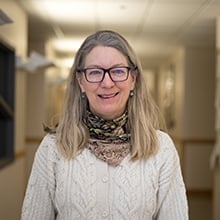

Lynn Sikkink PhD
Professor of Anthropology
Contact Information
Academic Divisions
Natural & Environmental Sciences DepartmentEducation
PhD., University of Minnesota, Anthropology, 1994MA, University of Minnesota, Anthropology, 1988,
BA, University of Colorado, Anthropology, 1981
Biography
How did you discover Western?
As a recent high school grad I was considering a move to Colorado to establish residency before applying to colleges, when my dad suggested Western. Even though I took my own path and got my anthropology degree elsewhere, I often wondered whether I might have been better off at Western. After getting my PhD from University of Minnesota, I taught at two other universities before finding a job opening at Western, applying, and getting an offer. Living in Gunnison and teaching at Western felt like coming home. It also felt like fulfilling a premonition about my career from my father.
What are some of the highlights of your career?
Doing fieldwork in the Andes of Peru and Bolivia allowed me to find myself as an anthropologist and individual. Living with my husband and daughter for six months on a Fulbright fellowship in Cochabamba, Bolivia, further deepened my connections to the people and cultures of the Andes. When I came to Western, I introduced students to a new ‘field’ right here in Colorado—the San Luis Valley, where I found interesting parallels to Latin America and inspiring features to explore much closer to home. Seeing cultural landscapes through the eyes of my students has been an important part of this learning experience. After publishing many academic articles and a book, New Cures, Old Medicines, about the women who sell traditional remedies in Bolivian marketplaces, I began to pursue creative writing full tilt. This new direction opens a way to conveying anthropological understanding through a different genre, and I’ve since published an essay (The Smart Set) and a short story (Masters Review).
What most excites you about your field?
Anthropology is the only discipline that investigates the nature of humanity both culturally and biologically in all parts of the earth. Anthropology is also the only field that studies humankind both in its current context and throughout humanity’s long history. Because of these features, anthropology is crucial to knowing who we are as a species and how to shape our response to the future. Introducing students to this broad scope is my mission as an instructor, and watching students get excited about our discipline is a thrill. At Western, because we can take students on wonderful field trips in our region, whether to view ancient rock art panels, attend ceremonies, or talk one on one with artisans, farmers, or museum curators, the field of anthropology opens a world of possibilities.
What is your favorite thing about the Gunnison Valley?
Right here at home we have a wealth of anthropological riches! From the ‘oldest house’ in North America on W Mountain, to the homeland of their Ute descendants, to the vibrant ranching and mining history still evident, to an interesting cultural mix represented by Crested Butte, Gunnison, and settlements in between, it is impossible to run out of topics to study from an anthropological perspective as well as finding countless human issues to ponder.